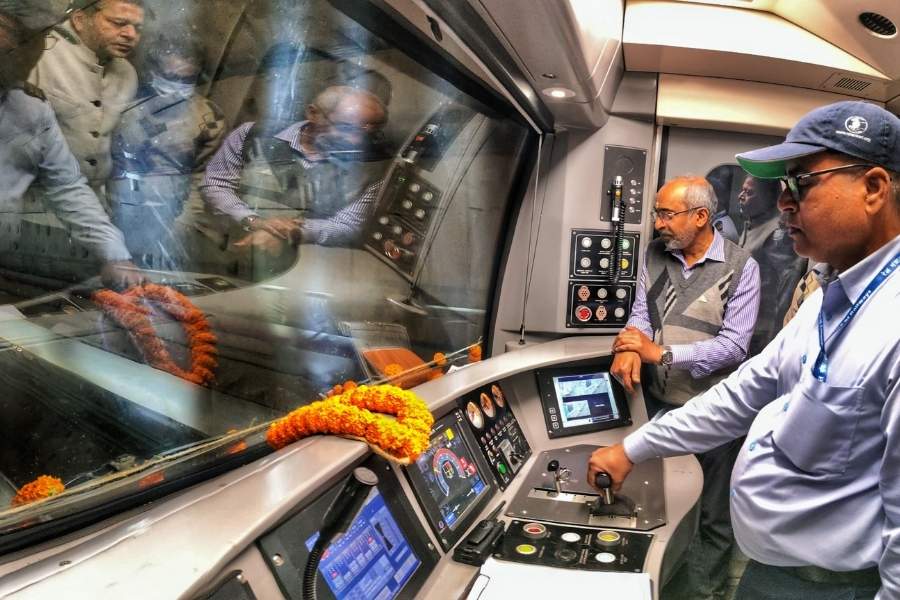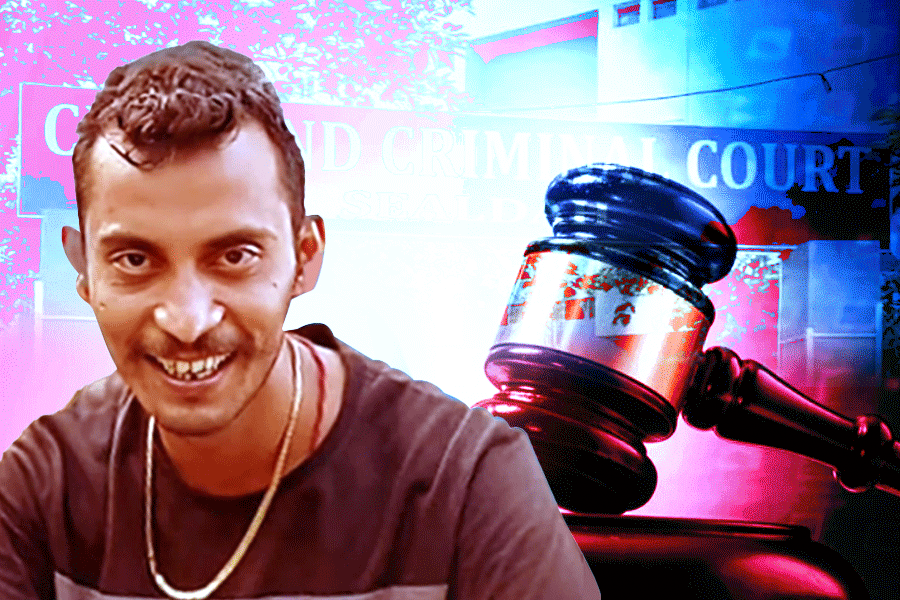 Wednesday, 22 January 2025
Wednesday, 22 January 2025
 Wednesday, 22 January 2025
Wednesday, 22 January 2025
Delhi’s Sarai Kale Khan Chowk was renamed as Birsa Munda Chowk, Union home minister Amit Shah inaugurated a statue of Birsa Munda in the national capital and Prime Minister Narendra Modi inaugurated development projects “worth over Rs 6,640 crore” in Bihar to honour Birsa Munda on Friday.
In Jamui, Bihar, Modi began and ended his speech lauding Birsa Munda. Every time he shouted “Bhagwan Birsa Munda,” the crowd responded with “amar rahein, amar rahein [long live]”.
The prime minister said the celebration of the Janjatiya Gaurav Divas on the 150th birth anniversary of Birsa Munda was an “honest effort to correct a great injustice” as the tribal community had not received “the recognition in history it deserved”.
The Telegraph Online looks back at the life and legacy of Birsa Munda, a tribal leader from present-day Jharkhand.
Who was Birsa Munda?
Birsa Munda was born on November 15, 1875 – 18 years after India’s first war of independence in 1857 – to a Munda tribal family in a village named Ulihatu in the Chota Nagpur region of present-day Jharkhand.
In 1793, Lord Cornwallis, then commander in chief of British India, had introduced the zamindari system in the Chota Nagpur plateau region. The zamindari system, one of the East India Company’s policies, broke up the tribal “khuntkatti” agrarian system where the whole tribal community shared ownership of land.
The zamindari system gave birth to a new class of landlords aka zamindars, who would collect tax and heavily exploit the tribals. Gradually, the “beth begari” (forced labour) system came into force.
In the 1890s, Birsa Munda started the Ulgulan movement and rebelled against British rule. “Abua raj setar jana, Maharani Raj tunda jana” or "Let the kingdom of the British Queen be ended and our kingdom be established" is a popular slogan he raised.
President Droupadi Murmu, paying tribute to Birsa Munda on Friday, called the Ulgulan movement “much more than a rebellion”.
“It was a fight for both justice and cultural identity,” Murmu wrote in an article headlined “Bhagwan Birsa Munda at 150: Celebrating the Spirit of Janjatiya Gaurav.”
Due to poverty, Birsa Munda’s father Sugna Munda left Ulihatu for Kurumbda to earn livelihood as a sharecropper. Sugna Munda converted to Christianity in the early years of his life. As a result, Birsa Munda’s birth name was Daud Munda.
To attend a German missionary school, Birsa Munda converted to Christianity, and was renamed as Birsa David/Daud. Later, in the company of Anand Panre, a munshi of Bandgaon zamindar, Birsa Munda was influenced by Vaishnavism. He went on to found a sect called the Birsait, and his followers called him Bhagwan.
The outsiders, including the moneylenders and the tax collectors were referred to as the dikus by the tribal people. In the 1890s, to establish an independent “Munda Raj”, Birsa Munda started mobilising tribes belonging to Chota Nagpur, Bengal and Odisha against the dikus.
In 1895 the British charged Birsa Munda for rioting and sent him to jail for two years. After his release in 1897, Munda continued his movement till he died of cholera in 1900.
The aftermath of the Ulgulan Movement
Eight years after Birsa Munda’s death, the British enacted the Chota Nagpur Tenancy Act in 1908. The act restricted the transfer of tribal land to non-tribal people. The “khuntkatti” rights were recognised and subsequently “beth begari” was abolished.
Even now, any move to amend the Chota Nagpur Tenancy Act is opposed tooth and nail by tribal populations in Jharkhand.
Modi says tribal history has not been highlighted
During the address at Jamui, Bihar, Modi highlighted that he was joined by the descendant of Birsa Munda, Budharam Munda, and Mandal Murmu, descendant of tribal Sidhu-Kanh, brothers who led the Santhal Rebellion in 1855–1856.
After inaugurating projects worth “more than Rs 6,000 crore” for the welfare of the tribal community, Modi said that his government had increased the budget for the development of tribal areas from “less than 25,000 crore rupees” to “1.25 lakh crore rupees”.
He said that to honour the “valour and pride of the tribal community”, commemorative coins and postal stamps had been issued “in memory of Bhagwan Birsa Munda”. He also said that Birsa Munda Janjatiya Gaurav Upvans (Tribal Pride Gardens) would be established “in the tribal-dominated districts” of India to celebrate Birsa Munda’s 150th birth anniversary.
Have Birsa Munda’s ideals been incorporated?
“Through textbooks, everyone at least knows the name of Birsa Munda right from their childhood,” Maroona Murmu, professor of history at Jadavpur University, told The Telegraph Online. “They at least know the names of Sidhu-Kanu and Birsa Munda even if they do not know anything else. But, that is all they know for tokenism purposes.
“The ideals that they had - they wanted rights for the indigenous people - that have never been given to the people,” professor Murmu added.
“We do not get to hear much of adivasi leaders,” she said. “The entire curriculum of history has to be rewritten. The oppressor always writes the history, the oppressed do not speak for themselves.”
Professor Samata Biswas, who teaches at the department of English at The Sanskrit College and University and whose area of research includes Migration and Refugee Studies and Caste, had a slightly different take.
“They are trying to appropriate any important tribal figure. The BJP is desperately trying to intensify the influence of the RSS on the indigenous people for years,” Biswas told The Telegraph Online.
Modi claimed that while the previous governments deprived the tribal communities of “basic facilities for decades”, “tribal welfare” had “always been a priority for the NDA government”.
“It was the NDA government led by Atal Bihari Vajpayee ji that created a separate ministry for tribal welfare,” the prime minister said.
Do tribals need ‘development’ or are they being robbed of their identity?
“The entire development model, the way it started, right from Nehru onwards, has a foundation on the displacement of the adivasis,” said professor Murmu.
“The paradigm of development has to be questioned. The adivasis always become collateral damages of the so-called development of the country,” she said.
“Birsa Munda wanted the rights of the indigenous people - jangal and zameen [forest and land]. It has not yet been fulfilled,” she added.
She said that although the Forest Rights Act of 2006 “was very progressive” as “it gave them the right to stay on certain lands where they had been staying for ages,” there was “eviction per the order of the Supreme Court with a movement like the NRC [National Register of Citizens].”
Murmu also highlighted the BJP’s promise of a uniform civil code in Jharkhand if elected.
“In that, the adivasis would not be included,” Murmu pointed out. “On what grounds do you actually ensure that? Tribal people are being put under the column of Hindu.”.
Infiltration of outsiders into tribal lands has been another theme of the BJP campaign in Jharkhand, a state where India’s ruling party is not in power.
“Everything depends on papers now – the number of documents you can produce,” said Murmu. “The Forest Rights Act has been removed, and now the adivasis do not have papers. They can say you do not have papers and so you’re an infiltrator.”
Importance of tribal history
Attacking the Congress, Modi mourned that after Independence, “attempts were made to erase” the contribution of the tribal community “to give credit for Bharat’s freedom solely to one party”.
“But if only one party or family secured independence, then why did the Ulgulan movement led by Birsa Munda happen? What was the Santhal Rebellion? What was the Kol Rebellion?” Modi asked.
Professor Biswas said reevaluation of history was a continuous process.
“We see now over the 60 years, people have reevaluated history. Those who used to be referred to as marginal or not-so-important figures, they all have gone through reevaluation,” she said.
“From that perspective, of course, Birsa Munda made an immense contribution. But, you should also think about how we measure contribution. Whose lives they impacted and who they represented – that is as important as whether or not the British Raj or the hostile government paid heed to their words,” she added.
Professor Murmu felt the titles bestowed upon Birsa Munda did not do justice to what he stood for and his goals.
“Birsa Munda is called Dharti Aaba [Father of Land]. But, that doesn’t help, right? BJP has now even started calling him Bhagwan Birsa Munda. Fancy titles do not do justice to what they had aspired for, what they fought for,” she said.
“Dedicating a small chapter to the leaders in the name of adivasi resistance for tokenism purposes doesn’t make much difference. Putting people in black and white doesn’t make much difference to the lives of the people who have been deprived of their livelihood, their homes,” she added.







